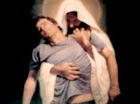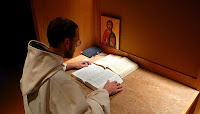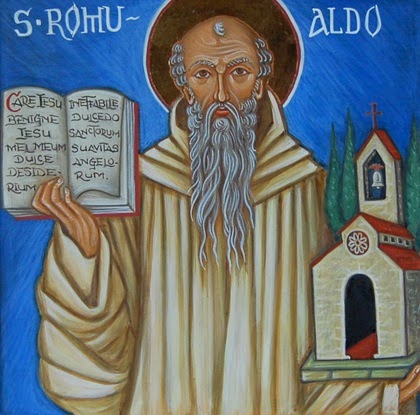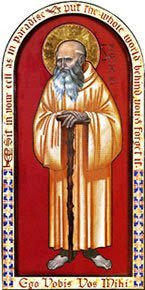 [[Dear Sister Laurel, how can someone write the following if they are not a canonical hermit? I ask because this person is clear she has private vows. Isn't she really misleading people? Won't people be hurt? [[My vocation as a consecrated Catholic hermit seems all the more in the background as far as the temporal aspects of this unique vocation. When I notice that the posts regarding "how" to become a Catholic hermit continue to be the most often read of my blog, I am thankful to be of assistance to others.]] I am also wondering how people are supposed to tell the difference between real Catholic hermits and fraudulent hermits. Is there a solution to this problem? You mentioned that Rome was concerned.]]
[[Dear Sister Laurel, how can someone write the following if they are not a canonical hermit? I ask because this person is clear she has private vows. Isn't she really misleading people? Won't people be hurt? [[My vocation as a consecrated Catholic hermit seems all the more in the background as far as the temporal aspects of this unique vocation. When I notice that the posts regarding "how" to become a Catholic hermit continue to be the most often read of my blog, I am thankful to be of assistance to others.]] I am also wondering how people are supposed to tell the difference between real Catholic hermits and fraudulent hermits. Is there a solution to this problem? You mentioned that Rome was concerned.]]
Googling "Becoming a Catholic Hermit":
Yes, if one googles 'becoming a Catholic hermit' or similar terms the website you are citing comes up at the top of the list. This, I think, is because the blog author fraudulently identifies herself in every post --- often several times in each post --- as a consecrated Catholic hermit. At the same time the author (Ms McClure) gives seriously incorrect instructions on how one becomes a Catholic hermit because she claims someone need only hear a divine call on their own and make private vows. A mistaken corollary she continues to assert is that private vows initiate one into the consecrated state. Were this true no lay vocation could use private vows and remain a lay vocation; similarly, public (canonical) vows and mutual discernment would be unnecessary in ecclesial vocations. But of course, Ms McClure ("joyful hermit") is wrong and misleads people in these matters to the extent people actually read and give credence to her blog.
However, generally speaking, a person trying to follow Ms McClure's instructions will run into problems which could be embarrassing and potentially isolating if they insist on being recognized as a consecrated Catholic hermit in their parishes or dioceses. When one does this pastors and bishops, vicars, canonists, and even religious men and women in staff positions will bring one up short with the truth: namely, unless one belongs to a canonical religious institute or made a public profession in the hands of the bishop of this diocese (or he accepted your profession if one later moved here) one is not a consecrated hermit. Period. Some might go farther and explain that pretending one is a consecrated hermit in spite of the truth will trivialize the vocation the church has recognized in canon 603 or in institutes of hermit monks and nuns; for that reason neither they nor you should do this. Rightly they will point out it will also confuse the faithful and potentially harm vocations in the church, especially to those discerning whether God might be calling them to become a consecrated hermit under c 603.
Pitfalls of the Blogosphere:
 But blogging is less restricted. One can claim to be anything, I suppose, nor does one have to publicize one's diocese, etc. (This is not really possible for those who claim canonical vocations; these folks must identify their institute, monastery, or diocese. This is part of claiming, and indeed having, a public vocation.) One who is making fraudulent claims can even convince oneself that a lie one tells is truth --- especially if one has nothing else to hold onto and/or because one cannot accept the truth. I cannot explain Ms McClure's fraudulent blogging any other way. This is especially so because she once understood the truth and struggled with it on another blog. As she wrote there, a canonist explained matters to her and at least twice she decided against requesting her bishop profess her under canon 603 while she accepted she would not be a Catholic hermit. She wrote then in response to her Bishop's letter: [[There is now even greater freedom, and the hermit is secularized as a hermit, for the angel did not say the hermit had been chosen for the "Catholic" hermit life but that God had chosen the hermit for the "hermit life." But the hermit is a Christian and is a Catholic at that, but simply a hermit.]] The Complete Hermit (cf October 8, 2007.)
But blogging is less restricted. One can claim to be anything, I suppose, nor does one have to publicize one's diocese, etc. (This is not really possible for those who claim canonical vocations; these folks must identify their institute, monastery, or diocese. This is part of claiming, and indeed having, a public vocation.) One who is making fraudulent claims can even convince oneself that a lie one tells is truth --- especially if one has nothing else to hold onto and/or because one cannot accept the truth. I cannot explain Ms McClure's fraudulent blogging any other way. This is especially so because she once understood the truth and struggled with it on another blog. As she wrote there, a canonist explained matters to her and at least twice she decided against requesting her bishop profess her under canon 603 while she accepted she would not be a Catholic hermit. She wrote then in response to her Bishop's letter: [[There is now even greater freedom, and the hermit is secularized as a hermit, for the angel did not say the hermit had been chosen for the "Catholic" hermit life but that God had chosen the hermit for the "hermit life." But the hermit is a Christian and is a Catholic at that, but simply a hermit.]] The Complete Hermit (cf October 8, 2007.)
At the time I very much appreciated Ms McClure's struggle and apparent resolution of this struggle as she came to accept a very difficult decision: she was/is a Catholic Christian and felt called by God to become a hermit but she would not be a Catholic hermit; her Bishop was not going to profess her. The next step in integrating this decision would need to be a growing appreciation for the lay eremitical vocation, something I hoped for and reflected on here myself. That step would have really served others as Ms McClure worked to plumb the depths of this specific form of eremitical vocation. As I have noted here before, most hermits will always be lay hermits living this calling by virtue of their baptismal consecration sans the additional consecration and public profession of the consecrated state of life. For one to live eremitical life in the lay state could mean one becomes a resource to others who will only live eremitical life in the lay state. The lay hermit can be a significant prophetic presence within the Church and for the world more generally (think Desert Abbas and Ammas). But that means accepting the truth that one is truly living eremitical life in the lay (versus the consecrated) state of life.
The Problem of Verification:
 You ask how one is supposed to tell the difference between a canonical and a non-canonical hermit. The first thing, of course, is to ask the person directly; "Are you canonically (publicly) professed as a hermit?" Similar questions a canonical hermit will answer include, "In whose hands (what bishop/diocese) were you professed?" "Who is your legitimate superior?"
You ask how one is supposed to tell the difference between a canonical and a non-canonical hermit. The first thing, of course, is to ask the person directly; "Are you canonically (publicly) professed as a hermit?" Similar questions a canonical hermit will answer include, "In whose hands (what bishop/diocese) were you professed?" "Who is your legitimate superior?"
A Catholic hermit who is necessarily publicly professed will either identify the institute to which they belong (Camaldolese, etc.), or they will name the bishop of this diocese, the diocese in which they reside. As a diocesan hermit I was given a kind of affidavit on the day of perpetual profession which testifies to this event. It is signed by the bishop and notarized by the Chancery's ecclesial notary. I don't carry it around with me, of course, but I can easily show it if needed. If the hermit refuses to answer, one can contact (or have one's pastor contact) the local chancery and ask if a person is a consecrated hermit (one may add, "in good standing.") The chancery will answer yea or nay and they may provide the date of the hermit's perpetual eremitical profession but will give no other information.
Will People be Hurt?
You also ask if people will be hurt by counterfeit or fraudulent "consecrated hermits". The simple answer is yes. We see that hermits who wrongly or even fraudulently insist they are consecrated, religious, Catholic, or diocesan hermits do so seeking to be recognized and to have a public presence as such. They do not do so and simply fade into the desert never to be heard from again. They have groups on Facebook, blogs, etc. They may show themselves in cowls or habits and in some cases insist on styling themselves as Sister or Brother or Friar. In each of these cases they do so to garner readership, increase membership, and generally represent themselves as Catholic Hermits who are living eremitical life in the name of the Church. People will follow their example and (as noted in your own question) their own instructions on becoming Catholic hermits. At the very least they draw others into a lie which actually betrays the promise which lies at the heart of the Gospel and desert spirituality, namely, in Christ (and in solitude) you will find the freedom to be yourself without pretense or dishonesty. You will find the freedom to stand in the truth of your own identity.
Thomas Merton identified the promise of eremitical life in its witness to certain claims of nature and grace. Fraud and pretense do not witness to the claims Merton was describing. They belie these claims. Moreover, hermits have been stereotyped for centuries in terms of eccentricity, escapism, misanthropy, and the like. Lay hermits who pretend to consecration and style themselves publicly in ways they have no right to give strength to these stereotypes. If a person can't face the truth of who they are in the Church, how can they pretend to speak of the power of the Gospel lived in solitude to nurture personal truth? How can they witness to this happening in a relationship with God rooted in human poverty and Divine grace? Certainly those who persist in this kind of untruth, those who believe that they can become consecrated Catholic hermits by the wholly private act of making private vows and encourage others to follow them in the same kind of mistakes are not helping anyone to really become a "Catholic hermit".
CICLSAL, Rome, and Possible Solutions:

I did mention that CICLSAL (Congregation of Institutes of Consecrated Life and Societies of Apostolic Life) has taken up the problem of counterfeit or fraudulent hermits and may be doing more about this in the future. What solutions might they undertake? What can help? Canonists, I think, think in terms of additional canon law when they consider possible solutions but in this matter I can't see how more canon law will help. On one level the situation is not difficult: make sure every person claiming to be a consecrated hermit has her consecration or profession verified. Ordinarily this would happen on the parish level. If verification is not accessible, do not treat the person as a consecrated hermit.
On another level additional canons will not help. We already have two canons which affirm one may not style an enterprise Catholic unless one has been given the right to do so by proper authority. Perhaps this can be clarified so one knows these canons apply to persons and roles as well as to TV stations, businesses, or other enterprises but again, no new canons are required. Most folks know little or nothing of canon law anyway. Others see it as irrelevant and unnecessary. Some criticize canon law --- including canon 603 --- as a form of institutionalization which betrays the freedom of the hermit life. Additional canons only mean these same people will know even less about more canon law.
One solution (or series of interlocking solutions) depends on education. Pastors and others in leadership roles in the Church need to understand the importance and charism of the eremitical life. Unless people are educated to recognize the gift such a life is, they will not see the betrayal of the gift fraudulent hermits represent. Chanceries themselves cannot adequately discern such vocations unless they know what the charism of the solitary call to eremitical life is. (Part of this knowledge depends upon the capacity of the personnel discerning these vocations to unpack the richness of canon 603 so they are aware of how truly sufficient it is. Personally, I believe this "unpacking" is key to many of the problems involved in implementing canon 603.)
The same need for education exists regarding the rights and obligations associated with living eremitical life "in the name of the Church". There is a serious need to understand what these are and what it means to be admitted to the profession which allows one to live out this role. Certain terms need to be better understood by everyone in the Church as well: the consecrated state of life versus baptismal consecration, institutes (as used in c 603), profession (a term used only for public vows), public vs private (not identical with being known by people and unknown by people!), state of life, freedom versus license, ecclesial vocations, Catholic hermit, and maybe a handful of other terms.

What I would personally like to see is a publication by CICLSAL which serves as a guidebook to canon 603 and which explicates the meaning and vision of the central elements comprising the canon. Diocesan hermits themselves could assist with this. After all, we live the canon day in and day out and spend time understanding it better and better --- better, I would wager, than most canonists and bishops! The difference in the way I understood it when I first petitioned to be admitted to profession and today, especially after writing a couple of revisions of my Rule in the intervening years is really significant. Today I see the canon as a gem which is truly beautiful in the way it codifies and allows the light of the solitary eremitical vocation to shine forth. But it must be unpacked!
Such a guidebook could clarify the vocabulary mentioned above and reiterate the theology of the consecrated life which is misconstrued by fraudulent or mistaken hermits. It could clarify the meaning of Pars 920-921 in the Catechism of the Catholic Church. Similarly, such a guidebook could address the problems of discernment and formation of canon 603 vocations. It could be available to every diocese to assist them in discerning and assisting in the formation canon 603 hermits.
A second but important piece of any solution to the problem of counterfeits and frauds is a sound theology of eremitical life lived in the lay state. Hermits have significant and prophetic vocations, and this is true whether these vocations are lived in the lay (here I mean the nonclerical state) or the consecrated states. Remember that the term lay has two senses. The first is the hierarchical sense --- meaning the Church is hierarchical and this hierarchy is divided into clerical and lay. In the hierarchical sense anyone who is not part of the ordained priesthood is a lay person, The second is a vocational sense --- meaning one lives a vocation in a given stable state of life; one may be a priest or a lay person who is admitted to public profession as a hermit and thus, to the consecrated state of life. Vatican II began to publicize a recognition of the dignity and import of the lay vocation (i.e., any vocation lived in the lay state). It has taken time for the position of VII on the laity to be more fully integrated in the Church.
Only as lay persons took this vocational state seriously and wrote of their experience was VII's accomplishment in regard to the laity truly established (as noted above, something similar is true with diocesan hermits and c 603; diocesan hermits have explored the meaning of canon 603 by living this vocation day by day); lay hermits can expect something similar with regard to eremitical life lived with or without the benefit of private vows. Reflection on lay eremitical life can only be really adequately done by lay hermits but I believe this is certainly an important piece of the solution to fraudulent "consecrated" hermits. If those considering and discerning eremitical vocations can see that the choice between living eremitical life in the lay state or doing so in the consecrated state involves a choice between two genuinely significant vocations, we might see fewer occasions of counterfeit or fraudulent "consecrated" hermits.
 On Friday we heard the parable of the sower/soils, at least the latter or "analogy portion" of the parable where Jesus explains the story's meaning. We all know it well; seed is sown broadcast-style over a wide swath of ground. Some falls on the path, some on rocky ground, some of thorny ground, and some on rich ground. Jesus makes analogies of the act of broadcasting seed on each of these types of ground. When seed falls on the path it represents the hearer of the Word who is without understanding and the Word sown in his/her heart is stolen away by "the Evil One"; when seed falls on rocky ground it represents the person who receives the Word with joy and grace, but who is "without root" (or fails to allow the Word to take root within her) and falls away from life in and from the Word. When seed falls on thorny ground we are given a picture of the person who hears the Word, allows it to take root, but then allows anxiety and a yearning for other forms of riches to choke the life of the word out; and finally Jesus portrays the person in whom the Word takes root and bears an enormously rich harvest, 30, 60, 100 fold.
On Friday we heard the parable of the sower/soils, at least the latter or "analogy portion" of the parable where Jesus explains the story's meaning. We all know it well; seed is sown broadcast-style over a wide swath of ground. Some falls on the path, some on rocky ground, some of thorny ground, and some on rich ground. Jesus makes analogies of the act of broadcasting seed on each of these types of ground. When seed falls on the path it represents the hearer of the Word who is without understanding and the Word sown in his/her heart is stolen away by "the Evil One"; when seed falls on rocky ground it represents the person who receives the Word with joy and grace, but who is "without root" (or fails to allow the Word to take root within her) and falls away from life in and from the Word. When seed falls on thorny ground we are given a picture of the person who hears the Word, allows it to take root, but then allows anxiety and a yearning for other forms of riches to choke the life of the word out; and finally Jesus portrays the person in whom the Word takes root and bears an enormously rich harvest, 30, 60, 100 fold.




































































